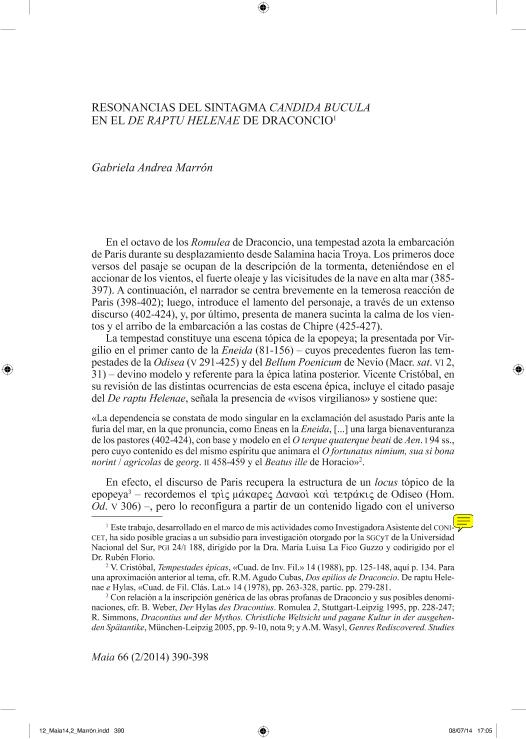Mostrar el registro sencillo del ítem
dc.contributor.author
Marron, Gabriela Andrea

dc.date.available
2016-12-26T20:09:29Z
dc.date.issued
2014-10
dc.identifier.citation
Marron, Gabriela Andrea; Resonancias del sintagma candida bucula en el De Raptu Helenae de Draconcio; Morcelliana; Maia; 66; 2; 10-2014; 390-398
dc.identifier.issn
0025-0538
dc.identifier.uri
http://hdl.handle.net/11336/10218
dc.description.abstract
Although the eighth of Dracontius’ Romulea is titled De raptu Helenae, the poet always refers to Helen through Leda, or by the adjectives Lacaena and Spartana. He denominates her by name only once (v. 440), where he also characterizes her as candida. This happens twenty verses after Paris, within a bucolic parliament pronounced offshore during a storm, uses the same adjective to describe the heifer two bulls are fighting about (vv. 418- 419). In this paper, we will try to demonstrate that Paris’ speech’s candida bucula, until now understood by translators, critics and commentators only as one of the pastoral elements listed by the Trojan, functions as a hinge point that alludes to Helen and suggests that her raptor’s heroic type might be close to the elegiac lover’s status.
dc.format
application/pdf
dc.language.iso
spa
dc.publisher
Morcelliana
dc.rights
info:eu-repo/semantics/openAccess
dc.rights.uri
https://creativecommons.org/licenses/by-nc-sa/2.5/ar/
dc.subject
Helena
dc.subject
Pelea de Toros
dc.subject
Épica
dc.subject
Draconcio
dc.subject
Novilla
dc.subject.classification
Literaturas Específicas

dc.subject.classification
Lengua y Literatura

dc.subject.classification
HUMANIDADES

dc.title
Resonancias del sintagma candida bucula en el De Raptu Helenae de Draconcio
dc.type
info:eu-repo/semantics/article
dc.type
info:ar-repo/semantics/artículo
dc.type
info:eu-repo/semantics/publishedVersion
dc.date.updated
2016-12-22T20:37:59Z
dc.journal.volume
66
dc.journal.number
2
dc.journal.pagination
390-398
dc.journal.pais
Italia

dc.description.fil
Fil: Marron, Gabriela Andrea. Consejo Nacional de Investigaciones Científicas y Técnicas; Argentina. Universidad Nacional del Sur. Departamento de Humanidades. Centro de Estudios de Filología Clásica, Antigua y Medieval; Argentina
dc.journal.title
Maia
Archivos asociados
